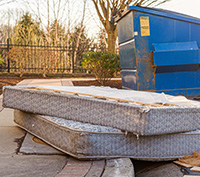
Illegal dumping

The illegal dumping of household rubbish, garden, building or commercial waste, or other waste material pollutes and damages the environment and impacts on Brisbane City Council's efforts to be a clean, green and sustainable city.
What is illegal dumping?
Illegal dumping is the unlawful deposit of any type of waste material that is equal to, or more than, 200 litres in volume.
Note - Council classes items left on a footpath (outside of scheduled kerbside large item service collection days) or outside a charity bin or shop, as 'illegal dumping'.
For information on littering (unlawful deposit of any type of waste material of an amount less than 200 litres in volume), view our Reducing litter page.
Impacts of illegal dumping
Every year, Council spends about $500,000 on cleaning up illegally dumped waste. Even more money is spent on fixing infrastructure and natural areas impacted by dumping.
Illegal dumping can:
- lower property values
- attract other illegal activities
- cause chemical and physical pollution in our neighbourhoods and waterways
- spread pests and weeds (including fire ants and lantana)
- encourage others to unlawfully dump further waste material
- pose a fire hazard or accident risk
- block stormwater drains
- act as a breeding ground for vermin such a rats, mice, flies and mosquitoes
- pose a health and safety risk if dumped waste includes sharp objects, asbestos, toxic substances, nappies and medical waste
- pose a suffocation risk to children (e.g. doors attached to white goods).
Report illegal dumping
If you witness an illegal dumping incident or find illegally dumped material, report it to Council.
Your personal safety is important. Do not approach a person depositing illegal waste, or disturb the site.
Fines and prosecution for illegal dumping
As of 1 July 2023, the value of a penalty unit is equal to $154.80. The fine amount must be rounded down to the nearest dollar after the calculation. For example, the fine amount for an infringement of two penalty units is: 2 x $154.80 = $309.60. The rounded down fine amount is $309.
Council can issue on-the-spot fines to individuals and corporations for dumped waste.
| Volume | Individuals | Corporations |
|---|---|---|
| Less than 200 litres | 2 penalty units | 10 penalty units |
| Between 200-2500 litres | 16 penalty units | 50 penalty units |
| Over 2500 litres | 20 penalty units | 75 penalty units |
For more serious offences, Council will consider prosecution with maximum penalties in the order of 400-1000 penalty units. Maximum penalties may apply in the following circumstances:
- dumping by repeat offenders
- dangerous waste (such as asbestos, medical waste or waste that is likely to cause harm to a person, property or the environment)
- dumping by commercial and small business operators.
Received a fine? Find out your payment options.
How to help stop illegal dumping
Always ask for a transfer station receipt:
- from contractors removing waste from your property (e.g. builders, landscapers, gardeners)
- if someone borrows your vehicle to remove waste from their property (e.g. green waste)
- from employees removing waste using business vehicles.
If your vehicle is identified at a dump site, you can be fined or prosecuted.
Be responsible with waste disposal
| Type of waste | Disposal |
|---|---|
| Excess household and green waste | Visit a resource recovery centre. |
| Household hazardous waste | Read our household hazardous waste page. Consider dropping off items at a free household hazardous waste drop-off day. |
| Hard fill or inert wastes (e.g. soil, concrete, bricks, inert wastes such as glass or tin) | For domestic quantities, visit a resource recovery centre. For commercial quantities, contact a private operator or disposal outlet that accepts these products. |
| Large scale waste removal | Use commercial waste collectors and skip hire companies. |
| Tyres, vehicles and other recyclables | Use commercial waste recyclers. |